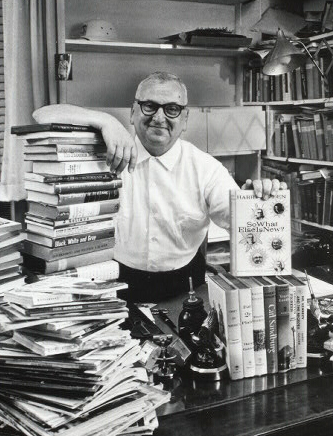An interesting perspective and response to racial segregation came from a North Carolina satirist named Harry Golden. Golden achieved fame as publisher of The Carolina Israelite, which he issued from 1944 to 1968 from Charlotte to an international audience. Golden had enough following that he appeared frequently on television talk shows, including Edward R. Murrow's Person to Person; and he testified before Congress on civil rights legislation. He also testified before the Pearsall Commission in 1956 during the development of the Pearsall Plan. The Pearsall Plan was a package of legislative and constitutional amendments designed to significantly slow the state's progress at integrating public schools following the Brown v. Board Supreme Court ruling.
Golden used humor and satire to oppose Southern racial and political practices. Martin Luther King Jr. recognized his significance by identifying him as one of "our white brothers who have grasped the meaning of this social revolution and committed themselves to it."
Golden's Vertical Negro Plan: A response to discrimination
In 1955 Golden addressed the North Carolina Literary and Historical Association on "The Jewish People of North Carolina." He came to national attention in 1956 after he testified before the Pearsall Commission that white Southerners did not seem to mind standing with African Americans: "It is only when the Negro 'sets' [sits down] that the fur begins to fly." Thus, he suggested, public schools could be painlessly integrated by providing desks but no seats. He went on to suggest sixteen more plans that mocked Southern racial mores.
Wide circulation of his "Vertical Negro Plan" soon generated interest in his writing and in 1958 a compilation of his columns, Only in America, appeared on the best seller list. He advised Robert Kennedy in his 1964 and 1968 campaigns for the U. S. Senate and the Democratic presidential nomination. He continued to publish the Israelite until 1968 when he closed the paper. In 1979 he received the North Carolina Award for Literature.
This entry appears in ANCHOR courtesy of the North Carolina Highway Historical Marker Program, edited for ANCHOR. Used by permission.
References:
Harry Golden Papers, Atkins Library, UNC-Charlotte
Harry Golden, Only in America (1958), (1959), Carl Sandburg (1961), and The Right Time (1969)
R.A. Hohner, "The Other Harry Golden: Harry Goldhurst & the Cannon Scandals," North Carolina Historical Review (April 1988):
